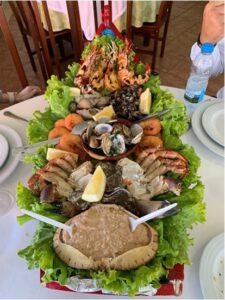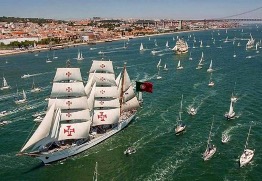The Portuguese are latin but they don't fit into the stereotype. They tend to not be as energetic,noisy, feisty as most latins, actually they tend to be calm, reserved and even formal at times. They can be sometimes a bit rude and upfront if they feel it's necessary but generally they are warm people who like to receive foreigners and to help them. It is no coincidence that according to the Global Peace Index 2021 it is the fourth most peaceful country in the world. However, they retain some latin traits, the summer sun and hot temperatures making their skin dark, while they enjoy its beautiful beaches.
Daily meals are sacred. Although less and less have breakfast with the family, they continue to sit at the table, at home or in a cafe in groups. At lunch, it is normal to see them eating together in restaurants with their co-workers – not because they have high wages but because the food in the restaurants is good and cheap. It's easy to find establishments that serve a full meal with coffee for €8 or less –. The dinner, if possible, is in family.
On weekends and festive days, they get together with family and friends or go out for lunch, taking advantage of the quality of the existing offer, that includes 26 Michelin-starred restaurants in the country.
Proud of their history, they insist on showing it. However they are not stuck in the past and we see them show with pleasure their ATMs where they can basically pay everything, their highways where they don’t stop to pay tolls and so many other ways technology is used to make their lives easier and that amazes visitors from all over the world.
The Rate of Natural Increase – Difference between the number of births and the number of deaths – in Portugal is negative since 2009, which leads to an aging population with a tendency to decrease. A situation that is aggravated by the Net Migration – Difference between the number of emigrants and immigrants which is also negative. Although there is a high level of illiteracy, especially in the interior of the country, a significant part of the population speaks English well, which facilitates communication with foreigners.
Paul Krugman, Nobel Prize for Economics, said, that in the long run, everything comes down to productivity. This is where the Portuguese fail, the excess of bureaucracy, the high level of illiteracy and unemployment among the population, as well as its geographical location that forces the raw materials they use and the products they make to travel great distances to reach the large markets. The average productivity of the Portuguese is almost half of the average productivity of Germany. These factors mean that, especially in the countryside, house prices are quite appealing, compared to most European countries.
This fact leads more and more foreigners, attracted by the climate, low cost of living, delicious cuisine, great wines, beautiful beaches and landscape, to choose to reside in this country. In the last decades, this situation has been reversed with the emergence of strong agglomerates that encompass from the mold industry to the textile industry.




